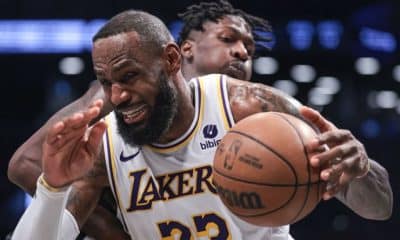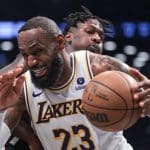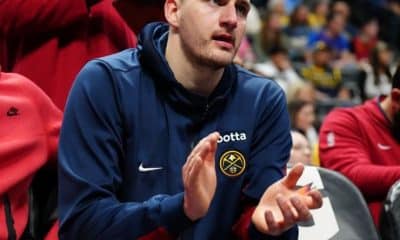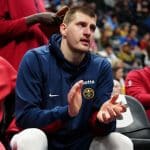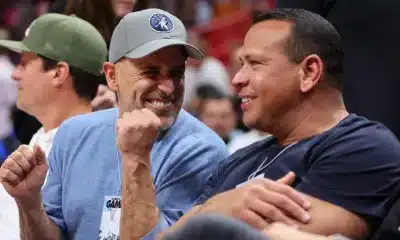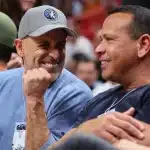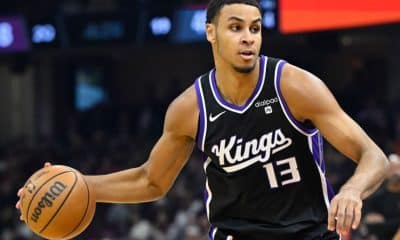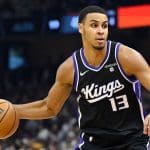NBA
Reviewing the Nurkic Trade: Denver’s Perspective
The Denver Nuggets have been on a miraculous run this postseason, but that doesn’t mean that they’re infallible. Drew Maresca reviews the 2017 trade that sent Jusuf Nurkic from Denver to Portland.
The Denver Nuggets are fresh off of a 114-106 win over the Los Angeles Lakers in the Western Conference Finals, pulling within three wins of the franchise’s first trip to the NBA Finals. But what if I told you that the Nuggets’ roster could be even more talented by acting more deliberately in a trade from three years ago?
While Denver won on Tuesday night, they lost a nail bitter on Sunday – for which most of the blame has been pointed at a defensive breakdown by Nuggets’ center Mason Plumlee, who was procured in the aforementioned 2017 trade. What did it cost Denver, you ask? Just Jusuf Nurkic and a first-round pick.
Nurkic was a 2014-15 All-Rookie second team member. He played 139 games over 2.5 seasons in Denver, averaging 7.5 points and 5.9 rebounds in approximately 18 minutes per game. He showed serious promise, but Denver had numerous reasons to pursue a trade: he’d suffered a few relatively serious injuries early in his career (and he’s continued to be injury-prone in Portland), butted heads with head coach Michael Malone and – most importantly – the Nuggets stumbled on to Nikola Jokic.
The Nuggets eventually attempted a twin-tower strategy with both in the starting line-up, but that experiment was short-lived — with Jokic ultimately asking to move to the team’s second unit.
The Nuggets traded Nurkic to the Portland Trail Blazers in February 2017 (along with a first-round pick) in exchange for Plumlee, a second-round pick and cash considerations. Ironically, the first-round pick included in the deal became Justin Jackson, who was used to procure another center, Zach Collins – but more on that in a bit.
As of February 2017, Plumlee was considered the better player of the two. He was averaging a career-high 11 points, 8.1 rebounds and 4.0 assists through 54 games – but it was clear that at 27, he’d already maximized his talent.
Conversely, Nurkic was only 23 at the time of the trade with significant, untapped upside. In his first few seasons with Portland, Nurkic averaged 15 points and 9.8 rebounds per game, while establishing himself as a rising star. As noted above, injuries have continued to be a problem. Nurkic suffered a compound fracture in his tibia and fibula in March 2019, forcing him to miss a majority of this current campaign. The COVID-19-related play stoppage in March gave Nurkic extra time to get his body right, and he returned to action in July inside the bubble.
And he did so with a vengeance. Nurkic demonstrated superior strength and footwork, and he flashed the dominance that Portland hoped he would develop, posting eight double-doubles in 18 contests. He averaged 17.6 points and 10.3 rebounds per game and while his play dipped a bit in the playoffs – partially due to a matchup with first-team All-NBA star Anthony Davis – he still managed 14.2 points and 10.4 rebounds in the five-game series. So it’s fair to say that Nurkic is still on his way toward stardom.
But the Nuggets are in the conference finals – so all’s well that ends well, right? Not so fast. To his credit, Plumlee is exactly who Denver expected him to be. He’s averaged 7.5 points and 5.5 rebounds per game in three seasons with Denver since 2017 – but to be fair, Plumlee is asked to do less in Denver than he had in Portland. Still, it’s fairly obvious that they’re just not that comparable.
Plumlee is a good passer and an above-average defender that’ll compete hard and isn’t afraid to get dirty – but he has limitations. He doesn’t stretch the floor and he is a sub-par free throw shooter (53.5 percent in 2019-20). More importantly, he’s simply not a major offensive threat and his repertoire of moves is limited.
High-level takeaway: Defenses tend to game plan for opponents they view as major threats – Nurkic falls into this category. Other guys pack the stat sheet through putback attempts, open looks and single coverage alongside the guys for whom opposing defenses game plan – that’s a more appropriate description of Plumlee.
On to the wrench thrown in by Zach Collins’ involvement. Statistically, Collins is about as effective as Plumlee – he averaged 7 points and 6.3 rebounds through only 11 games in 2019-20 due to various injuries – and he possesses more upside. The 22-year-old is not as reliable as Plumlee but given his age and skill set, he’s a far better option as a support player playing off the bench. He stretches the floor (36.8 percent on three-point attempts in 2019-20), is an above-average free throw shooter (75 percent this season) and is a good defender. Looking past Nurkic for a moment, would the Nuggets prefer a 22-year-old center that stretches the floor and defends or a 30-year-old energy guy?
Regardless of your answer to that question, it’s hard to argue that Nurkic should have returned more than Plumlee, definitely so when you factor in the first-round pick Denver included. There is obviously more at play: Denver was probably considering trading Nurkic for some time before they acted – did they feel that they could increase his trade value prior to the trade deadline in 2016-17? Maybe. Further, Nurkic and his agent could have influenced the Nuggets’ decision at the 2017 deadline, threatening to stonewall Denver in negotiations.
Had Nurkic been more patient or the Nuggets acted sooner before it became abundantly clear that he was on the move, Denver’s roster could be even more stacked than it is now. Ultimately, the Nuggets have a plethora of talent and will be fine – while it appears that Nurkic found a long-term home in Portland, where he owns the paint offensively. Denver can’t be thrilled about assisting a division rival, but they’re still in an enviable position today and should be for years to come.
But despite that, this deal should go down as a cautionary tale – it’s not only the bottom feeders of the league who make missteps. Even the savviest of front offices overthink deals. Sometimes that works in their favor, and other times it does not.
Add Basketball Insiders to your Google News Feed!
-
Main Page 1 week ago
LeBron James joins Michael Jordan as only NBA players with multiple 40-point games after turning 39
-
Main Page 1 week ago
Nikola Jokic 1st NBA player since Oscar Robertson with 26+ points, 18+ rebounds, & 16+ assists in a game
-
NBA 1 week ago
Ex-MLB star Alex Rodriguez vows to keep trying to buy Timberwolves franchise despite rejection
-
Main Page 1 week ago
Kings are 14-5 this season when Keegan Murray scores 19+ points
